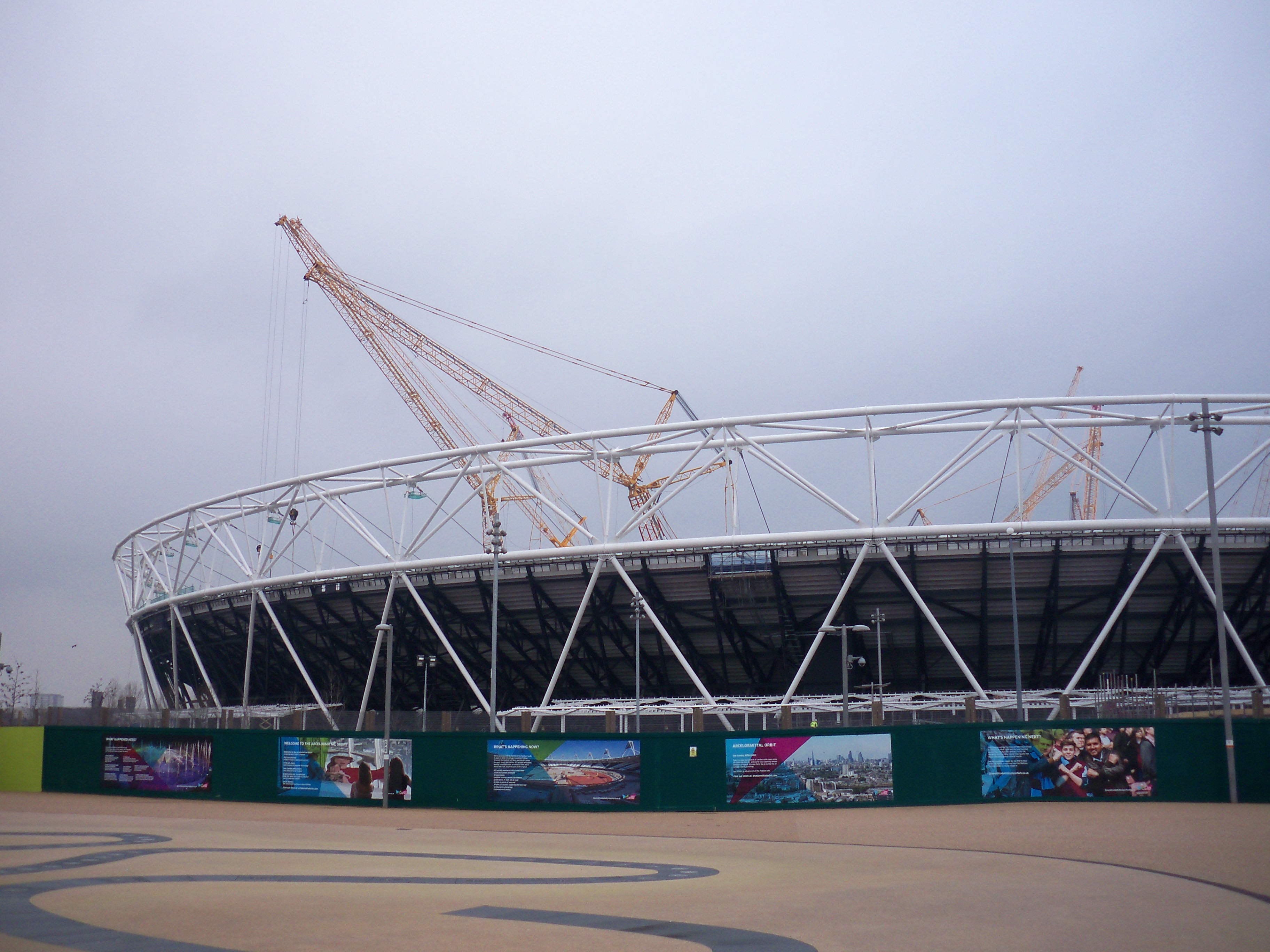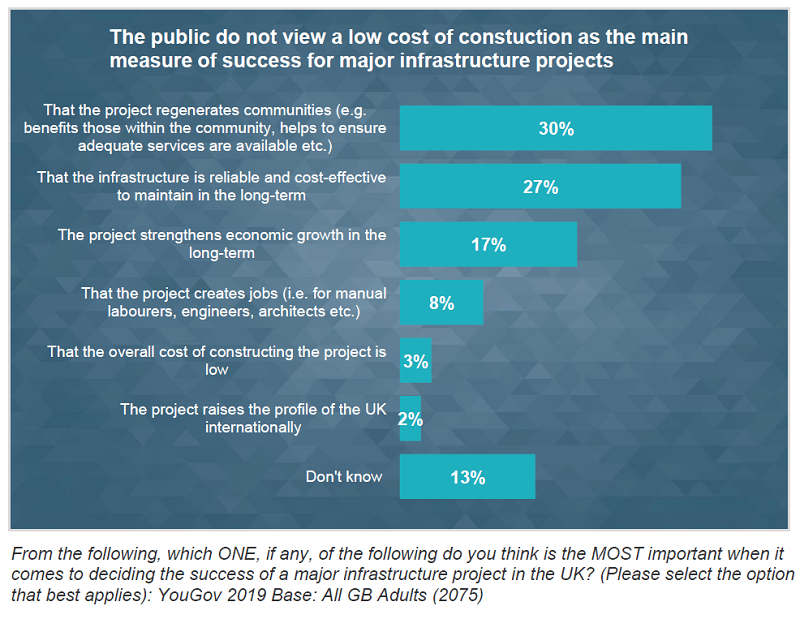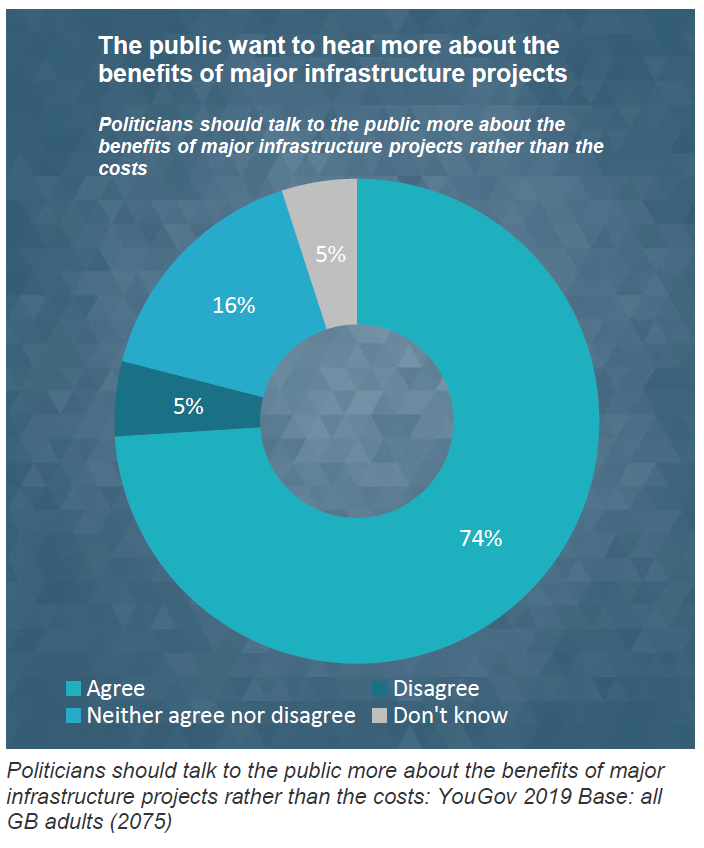Benefits, not cost, should be focus of key infrastructure projects

|
| The London 2012 Olympics is an example of a major infrastructure project where the benefits to the local area far outweighed the costs. |
Contents |
[edit] Introduction
More emphasis should be placed on the whole-life benefits of major infrastructure projects rather than cost, says a new ICE policy report. Published in May 2019, the report looks at how the built environment sector can reduce the gap between cost estimates and out-turns for major infrastructure projects.
ICE’s investigation into infrastructure forecasting shows, globally, that it is incredibly difficult to forecast time and cost for major projects due to there being many unforeseen issues that can arise during delivery. Despite these uncertainties, the ultimate measure of success continues to be initial cost forecasts.
The Institution recommendeds that the success measures for projects should shift from an over-focus on costs towards whole-life benefit. The survey data illustrates support from the general public for such a move.
Miles Ashley, Chair of the report’s steering group, said:
“Infrastructure is a vital part of society, with major assets helping to stimulate economic growth, improve health and well-being of the population and protect communities from the effects of extreme weather and climate change.
“We cannot continue to dismiss from the conversation these important benefits. Industry and government need to work smarter, find ways to reduce the disparity between forecasts and out-turns, but also to change the narrative and ensure the wider public, the end users, are also aware of the whole-life benefits these incredible infrastructure projects are bringing to them.”
[edit] Public support
There is public support for the recommendations, with nearly three quarters (74%) of adults agreeing that politicians should talk to the public more about the benefits major infrastructure projects bring, rather than the costs.
The survey, conducted by YouGov, also found that only 3% of adults feel that a low overall cost of construction should be the most important measure of success of major infrastructure projects.
ICE asked adults across Great Britain what they considered most important in deciding the success of major infrastructure projects:
- 3% said overall cost of construction should be low;
- 17% said the project should strengthen economic growth in the long-term;
- 27% said the infrastructure should be reliable and cost-effective in the long-term;
- 30% said the project should regenerate communities.
Adults were also asked to what extent they agreed that politicians should talk more to the public about the benefits of major infrastructure projects.
- Agree – 74%
- Neither agree nor disagree - 16%
- Disagree – 5%
- Don’t know – 5%
[edit] The recommendations
The report recognises the impact that relying on early estimates, created before full scope and complexity is known, can have on the final 'cost vs out-turn' conversation.
To minimise the disparity between early and final costs, ICE recommends industry adopts the principles set out in the government’s Outsourcing Playbook. It further discusses the way asset owners can use 'should-cost' estimations to obtain fairer and more accurate tenders.
The report also suggests how the Infrastructure Client Group’s Project 13 approach can help the sector move away from transactional arrangements towards an enterprise model.
Chris Richards, ICE Head of Policy and Public Affairs, said:
“Cost and time overruns on major projects is not an issue unique to the UK, it is a global industry challenge. Our paper outlines some of the ways the infrastructure community and government can work together to narrow the gap between cost forecasts and outturn to help alleviate the friction this can cause.
“We can't get away from the fact that major projects by their nature are large, unique and are built over a long time period with many factors that change over that time. The public are alive to that fact, but it is equally important that we continue to highlight the huge benefits these infrastructure projects bring to society.”
The report makes four recommendations:
- Infrastructure owners should complete scope, design and exploration before commencement of work is allowed, to avoid scope creep or retroactive changes, taking steps to include contractors in design at an early stage.
- The government and infrastructure owners must move away from capital cost as the most important metric when assessing project benefits, recognising the importance of whole-life economic, social and environmental value.
- Principles set out in the Outsourcing Playbook should be mandatory for government infrastructure owners, this includes infrastructure owners undertaking 'should-cost' modelling to help inform their expectations and knowledge of appropriate tender prices during the procurement process.
- It should be mandatory for all public infrastructure owners undertaking procurement to award contracts based on a cost estimate range, using a should-cost estimate as a reference point, with an amount of contingency allocated appropriate to the level of project maturity.
ICE will continue to work with government and industry to get these recommendations in practice.
Members with an interest or expertise in this area and who want to get involved through industry conversations or by writing on the ICE Infrastructure Blog should kindly ice.org.uk get in touch.
[edit] About this article
This article was written by Emma Beer of the Institution of Civil Engineers (ICE). It was first published on the ICE website in May 2019 and can be accessed here.
[edit] Related articles on Designing Buildings Wiki
- Brexit - The case for infrastructure.
- Government construction and infrastructure pipelines.
- Green infrastructure.
- Growth and Infrastructure Act.
- Infrastructure and Projects Authority.
- Infrastructure UK (IUK).
- Infrastructure nationalisation.
- London infrastructure plan.
- National Infrastructure Pipeline.
- National Infrastructure Plan.
- Nationally Significant Infrastructure Projects.
- Railway engineering.
- Smart cities.
- Traffic and transport.
[edit] Related ICE links
Featured articles and news
Infrastructure that connect the physical and digital domains.
Harnessing robotics and AI in challenging environments
The key to nuclear decommissioning and fusion engineering.
BSRIA announces Lisa Ashworth as new CEO
Tasked with furthering BSRIA’s impressive growth ambitions.
Public buildings get half a million energy efficiency boost
£557 million to switch to cleaner heating and save on energy.
CIOB launches pre-election manifesto
Outlining potential future policies for the next government.
Grenfell Tower Inquiry announcement
Phase 2 hearings come to a close and the final report due in September.
Progress from Parts L, F and O: A whitepaper, one year on.
A replicated study to understand the opinion of practitioners.
ECA announces new president 2024
Electrical engineer and business leader Stuart Smith.
A distinct type of countryside that should be celebrated.
Should Part O be extended to existing buildings?
EAC brands heatwave adaptation a missed opportunity.
Definition of Statutory in workplace and facilities management
Established by IWFM, BESA, CIBSE and BSRIA.
Tackling the transition from traditional heating systems
59% lack the necessary information and confidence to switch.
The general election and the construction industry
As PM, Rishi Sunak announces July 4 date for an election.
Eco apprenticeships continue help grow green workforce
A year after being recognised at the King's coronation.
Permitted development rights for agricultural buildings
The changes coming into effect as of May 21, 2024.
























